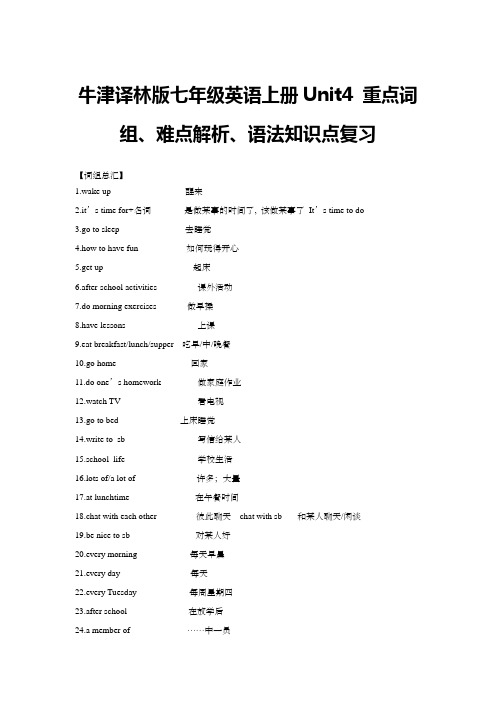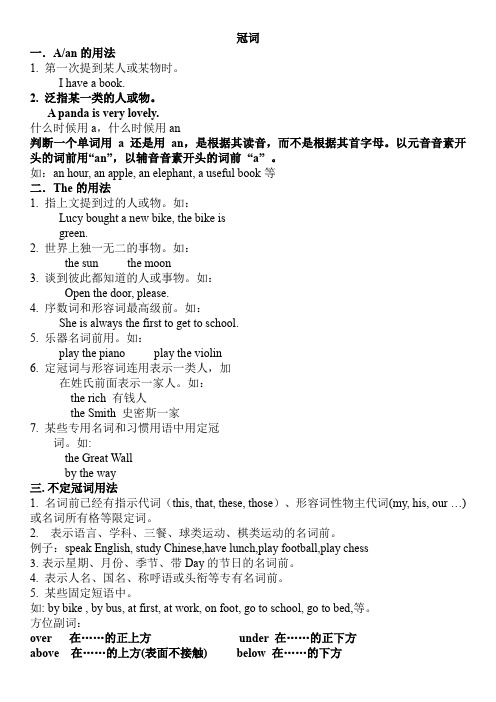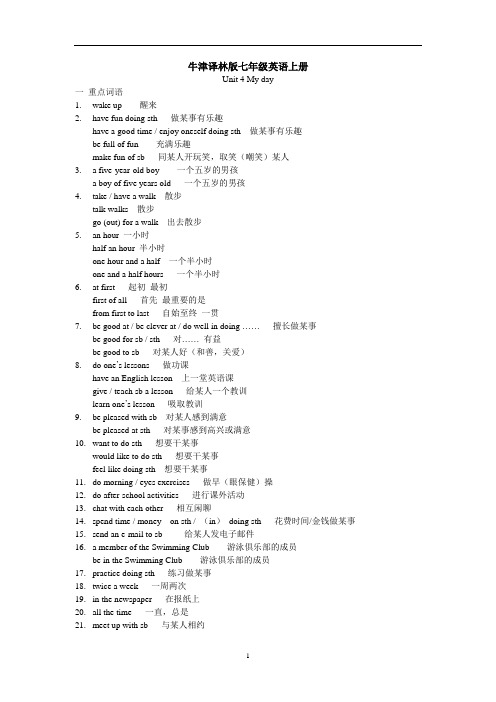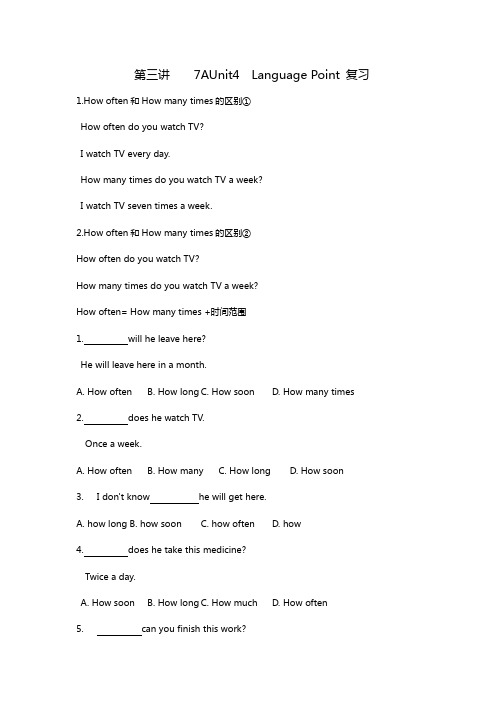牛津译林版七年级英语上册Unit4知识点讲解
牛津译林版七年级英语上册Unit4-重点词组、难点解析、语法知识点复习

牛津译林版七年级英语上册Unit4 重点词组、难点解析、语法知识点复习【词组总汇】1.wake up 醒来2.it’s time for+名词是做某事的时间了, 该做某事了It’s time to do3.go to sleep 去睡觉4.how to have fun 如何玩得开心5.get up 起床6.after-school activities 课外活动7.do morning exercises 做早操8.have lessons 上课9.eat breakfast/lunch/supper 吃早/中/晚餐10.go home 回家11.do one’s homework 做家庭作业12.watch TV 看电视13.go to bed 上床睡觉14.write to sb 写信给某人15.school life 学校生活16.lots of/a lot of 许多;大量17.at lunchtime 在午餐时间18.chat with each other 彼此聊天chat with sb 和某人聊天/闲谈19.be nice to sb 对某人好20.every morning 每天早晨21.every day 每天22.every Tuesday 每周星期四23.after school 在放学后24.a member of ……中一员25.the Swimming Club 游泳兴趣小组26.have a good time 玩的开心27.email sb 给某人发电子邮件28.play games 玩游戏, 进行比赛29.twice a week 一周两次30.have fun 娱乐,乐趣;开心P.27-3031.listen to the radio 听收音机32.make a model plane 制作模型飞机33.read newspapers 看报read books 看书34.write emails 写邮件35.watch football matches 看球赛36.watch too much TV 看电视太多37.listen to music 听音乐38.listen to the teacher 听老师讲39.walk a dog 遛狗40.a piece of good news 一则好消息41.in the school football team 在学校足球队42.all the time 一直43.know (a lot) about…对……了解(很多)44.read comic books 看连环漫画书45.on the volleyball court 在排球场46.from...to…从……到……47.meet up with sb. 约见某人48.do their homework 做他们的作业49.under a big tree 在大树下50.go to one’s dancing lesson 去上舞蹈课51.have (no) time to do sth. 有(没有)时间做某事52.have a lot of new friends 有许多新朋友53.teach us English 教我们英语54.talk about…谈论关于……55.at home 在家56.say hello to…向……问好P.31-3757.the Class 1,Grade 7 students 七年级一班学生58.go on a trip 旅行, 旅游have one’s trip59.look at the posters 看海报60.more than 多于;超过61.twice a week 一星期两次62.the China Space Museum 中国航空博物馆63.the China Science and Technology Museum 中国科技博物馆64.next Monday 下周一65.each student 每个学生66.thank you for doing sth 为做某事而谢谢你anize the class trip 组织班级旅游68.I would like to+动词原形愿意干某事;想要干某事69.the price for………的价格70.be open/be closed 开着、关着71.look forward to…期盼;盼望72.enjoy…very much 非常喜爱……73.need to do sth 需要做……74.borrow a pen 借一支钢笔75.be busy doing 忙于做某事76.be good for 有益于77.help sb do sth 帮助某人做某事78.get ready for 准备……79.learn more about 更多了解……80.the answer to ………的答案81.the Computer Club 电脑兴趣小组【难点解析】1.Is it time for breakfast? 是吃早餐的时间了吗?it’s time for+名词, “是做某事的时间了, 该做某事了”=it’s time to+动词原形.例如:It’s time for class.是上课的时间了。
Unit4语法冠词讲义牛津译林版英语七年级上册

冠词一.A/an的用法1. 第一次提到某人或某物时。
I have a book.2. 泛指某一类的人或物。
A panda is very lovely.什么时候用a,什么时候用an判断一个单词用 a 还是用an,是根据其读音,而不是根据其首字母。
以元音音素开头的词前用“an”,以辅音音素开头的词前“a” 。
如:an hour, an apple, an elephant, a useful book等二.The的用法1. 指上文提到过的人或物。
如:Lucy bought a new bike, the bike isgreen.2. 世界上独一无二的事物。
如:the sun the moon3. 谈到彼此都知道的人或事物。
如:Open the door, please.4. 序数词和形容词最高级前。
如:She is always the first to get to school.5. 乐器名词前用。
如:play the piano play the violin6. 定冠词与形容词连用表示一类人,加在姓氏前面表示一家人。
如:the rich 有钱人the Smith 史密斯一家7. 某些专用名词和习惯用语中用定冠词。
如:the Great Wallby the way三.不定冠词用法1. 名词前已经有指示代词(this, that, these, those)、形容词性物主代词(my, his, our …)或名词所有格等限定词。
2. 表示语言、学科、三餐、球类运动、棋类运动的名词前。
例子:speak English, study Chinese,have lunch,play football,play chess3.表示星期、月份、季节、带Day的节日的名词前。
4. 表示人名、国名、称呼语或头衔等专有名词前。
5. 某些固定短语中。
如: by bike , by bus, at first, at work, on foot, go to school, go to bed,等。
牛津译林版七年级英语上册Unit-4单元知识点(重点短语、句型)

牛津译林版七年级英语上册Unit 4 My day一重点词语1.wake up 醒来2.have fun doing sth 做某事有乐趣have a good time / enjoy oneself doing sth 做某事有乐趣be full of fun 充满乐趣make fun of sb 同某人开玩笑,取笑(嘲笑)某人3. a five-year-old boy 一个五岁的男孩a boy of five years old 一个五岁的男孩4.take / have a walk 散步talk walks 散步go (out) for a walk 出去散步5.an hour 一小时half an hour 半小时one hour and a half 一个半小时one and a half hours 一个半小时6.at first 起初最初first of all 首先最重要的是from first to last 自始至终一贯7.be good at / be clever at / do well in doing ……擅长做某事be good for sb / sth 对……有益be good to sb 对某人好(和善,关爱)8.do one’s lessons 做功课have an English lesson 上一堂英语课give / teach sb a lesson 给某人一个教训learn one’s lesson 吸取教训9.be pleased with sb 对某人感到满意be pleased at sth 对某事感到高兴或满意10.want to do sth 想要干某事would like to do sth 想要干某事feel like doing sth 想要干某事11.do morning / eyes exercises 做早(眼保健)操12.do after-school activities 进行课外活动13.chat with each other 相互闲聊14.spend time / money on sth / (in)doing sth 花费时间/金钱做某事15.send an e-mail to sb 给某人发电子邮件16. a member of the Swimming Club 游泳俱乐部的成员be in the Swimming Club 游泳俱乐部的成员17.practice doing sth 练习做某事18.twice a week 一周两次19.in the newspaper 在报纸上20.all the time 一直,总是21.meet up with sb 与某人相约22.know a lot about computers 精通电脑23.go to the dancing lesson 去上舞蹈课24.be busy with / doing sth 忙于做某事25.have much time to do sth 有很多时间做某事26.say hello / goodbye to sb 向某人问好/道别27.go on a study-trip 进行一次学习旅行28.on each side of the street 在街道的每一边29.thank sb for doing sth 感谢某人做某事30.the price for ……。
牛津译林版七年级英语上册Unit4知识点复习讲义

牛津译林版七年级英语上册Unit4知识点复习讲义一、学习目标1. 知识目标:A. 学会重点词汇:wish, luck, museum, twice, picnic, once, dislike, reason, ready, learn, worldB. 学会重点短语:go on a picnic, twice a month, be good for, help sb. do sth.; get ready for sth.; learn a lot about the world, too muchC. 掌握句型:I hope everyone can come and watch the game.How often do you visit a museum?I like to go on picnics with my family.They help us get ready for the day.I can learn a lot about the world.2. 能力目标:A. 能够正确使用四会词汇和短语,并熟练地掌握好这些词汇和短语的基本用法。
B. 能够介绍自己的学校生活。
二、重点、难点重点:掌握重要词汇、短语及句型。
难点:灵活使用重要的短语和句型,掌握a lot与a lot of的不同。
知识梳理:一、单词领读动词v. wish, learn名词n. luck, museum, picnic, dislike, reason, world副词adv. twice, once形容词adj. ready二、重点单词【单词学习】1. wish ☆☆【用法和例句】(1) v. 希望,祝愿,后接动词不定式作宾语或宾语补足语,还可接宾语从句。
I wish to get home before dark. 我希望天黑前到家。
(2) n. 愿望Then Millie makes a wish, blows out the candles and cuts the cake.然后米丽许了个愿,吹灭蜡烛,又切开蛋糕。
2021-2022学年牛津译林版英语七年级上册unit4 hill词汇讲义

Unit4词汇讲义拓展hill英 [hɪl]美 [hɪl]第三人称复数:hillshill 基本解释名词小山,山冈; 斜坡动词把…堆成小山; 培土于…周围hill 同义词名词heapelevationmoundhill 反义词名词dalehill 相关词组1. a hill of beans : 少量, 小事;2. go over the hill : 越狱, 逃跑;3. up hill and down dale : 翻山越谷, 彻底地, 到处;4. over the hill : 开小差, 在衰退中;hill 相关例句名词1. His red house stands on a hill.他的红房子位于小山上。
2. I climbed up the hill and ran down the other side.我爬上了小山,又从另一面跑下来。
hill 网络解释1. 小山:然后让学生根据单词设想这样一种情景:小山(hill)中有一座装满(fill)药丸(pill)的面粉厂(mill),直到(till)将要(will)杀死(kill)病(ill)人时才被发现. 教师还可引导学生设想更多的与这些词有关的情景,以进一步巩固记忆这一词块.2. 岗:游行本来计画从奥林匹克大街和百老汇大街的交口处开始,可是由於参加游行的群众过多,百老汇大街已经无法容纳潮水般的人流,结果人们不得不分别从南北两个方向沿著百老汇大街、山岗(Hill)大街和春天(Spring)大街同时向市政府挺进.hill 词典解释Unit4词汇讲义拓展1. 小山;山冈;山丘A hill is an area of land that is higher than the land that surrounds it.e.g. We trudged up the hill to the stadium.我们费力地爬到山上的体育场。
e.g. ...Maple Hill.梅普尔山2. 人老珠黄;在走下坡路;在衰退中;过气If you say that someone is over the hill, you are saying rudely that they are old and no longer fit, attractive, or capable of doing useful work.e.g. He doesn't take kindly to suggestions that he is over the hill.他不爱听别人说他风光不再。
牛津译林版七年级英语上册Unit4单元知识点总结

牛津译林版七年级英语上册Unit4Welcome to the unit1.Well, after breakfast I want to go to sleep, ...哦,早饭后我想睡觉……(1)after breakfast意为“早饭之后”,after 是介词,“在……之后”。
相关词组:after school放学之后;after class课后;after sb.跟在某人之后(2)go to sleep意为“入睡,睡着”,强调入睡的动作,这里的sleep是名词。
辨析:go to sleep, fall sleep 与go to bed①Go to sleep意为“入睡,睡着”,强调从醒着到熟睡的过程,是自然入睡。
②fall sleep意为“睡着”,强调“突然入睡”的意思。
③go to bed意为“上床睡觉”,强调上床睡觉这个动作,是否睡着不管。
2.You want to keep a diary too. 你也想记日记。
keep a diary 意为“记日记”,一般不用write a diary。
但如果是“做记录”,则可以用。
如:He is writing a diary for teaching. 他正在做教学记录。
Reading1.We always chat with each other or play games.我们总是相互聊天或做游戏。
(1)chat意为“闲谈,聊天”,既可作不及物动词,也可作名词。
作动词后带宾语时必须加介词with辨析:chat with 侧重于“闲聊”,而talk with/to 侧重于“谈话”,有时含有上级对下级,长辈对晚辈谈话的含义。
如:Our English teacher likes talking with us.我们的英语老师喜欢找我们谈话。
(2)each other意为“彼此,相互”,是相互代词,强调两者之间的“相互”,其名词所有格为each other's 。
Unit4知识点梳理2023-2024学年牛津译林版英语七年级上册

第三讲7AUnit4 Language Point 复习1.How often和How many times的区别①How often do you watch TV?I watch TV every day.How many times do you watch TV a week?I watch TV seven times a week.2.How often和How many times的区别②How often do you watch TV?How many times do you watch TV a week?How often= How many times +时间范围1. will he leave here?He will leave here in a month.A. How oftenB. How longC. How soonD. How many times2. does he watch TV.Once a week.A. How oftenB. How manyC. How longD. How soon3. I don't know he will get here.A. how longB. how soonC. how oftenD. how4. does he take this medicine?Twice a day.A. How soonB. How longC. How muchD. How often5. can you finish this work?A. How oftenB. How manyC. How longD. How soon6. have you been at this factory?I have been here since 1993A. how longB. how soonC. how oftenD. how many7. does your sister write to your parents?A. How soonB. How longC. How muchD. How often8. does it take you to finish you homework every day?.A. How oftenB. How manyC. How longD. How soon9. will he stay here?A. how longB. how soonC. how oftenD. how many10. did the meeting last?About half an hour.A. How soonB. How longC. How farD. How often3.Reading is fun.阅读是有趣的事。
Unit4知识点梳理牛津译林版七年级英语上册

牛津译林版七上Unit 4 知识点梳理1.Wake up, Eddie. 醒醒,埃迪。
wake up:“醒来”。
“唤醒某人”:如果所接宾语是人称代词,只能放在wake和up中间;如果所接宾语是名词,放在up、前后均可。
awake:adj.“醒着的”。
2.Is it time fro breakfast? 到吃早饭的时间了吗?It’s time for sth.“是做某事的时间了。
”= It’s time to do sth.It’s time for sb. to do sth.“该是某人做某事的时候了。
”3.Shall we go walking in the hills? 我们去山上散步好吗?Shall we...? “我们……好吗?”(表示征求或提出建议。
)4.I seldom go out. 我很少外出。
seldom:adv.“很少,不常,难得”(位于行为动词之前,助动词、情态动词或连系动词之后),表示否定。
go out:“出去”。
5....and then I have lunch. ……然后吃午饭。
have lunch:“吃午饭”。
→have breakfast “吃早饭”;have dinner/supper “吃晚饭”。
have:v.“吃;喝”;“有”;“举办,举行”;“度过,经历”。
三单:has。
6.After lunch, I always need a good rest. 午饭后,我总是需要好好休息。
need:v.“需要”。
need sth. “需要某物”;need to do sth. “需要做某事”;need sb. to do sth. “需要某人做某事”;sth. need(s) doing “需要”。
情态动词,“需要”,后接动词原形,常用于否定句和疑问句。
rest:n.“休息,歇息”(= break)。
have a (good) rest “(好好)休息”。
作动词,“休息”。
- 1、下载文档前请自行甄别文档内容的完整性,平台不提供额外的编辑、内容补充、找答案等附加服务。
- 2、"仅部分预览"的文档,不可在线预览部分如存在完整性等问题,可反馈申请退款(可完整预览的文档不适用该条件!)。
- 3、如文档侵犯您的权益,请联系客服反馈,我们会尽快为您处理(人工客服工作时间:9:00-18:30)。
牛津译林版七年级英语上册7A Unit4 重点词组、难点解析、语法复习【词组总汇】1. wake up 醒来2. it’s time for+名词是做某事的时间了,该做某事了It’s time to do3. go to sleep 去睡觉4. how to have fun 如何玩得开心5. get up 起床6. after-school activities 课外活动7. do morning exercises 做早操8. have lessons 上课9. eat breakfast/lunch/supper 吃早/中/晚餐10. go home 回家11. do one’s homework做家庭作业12. watch TV 看电视13. go to bed 上床睡觉14. write to sb 写信给某人15. school life 学校生活16. lots of/a lot of 许多;大量17. at lunchtime 在午餐时间18. chat with each other 彼此聊天chat with sb 和某人聊天/闲谈19. be nice to sb 对某人好20. every morning 每天早晨21. every day 每天22. every Tuesday 每周星期四23. after school 在放学后24. a member of ……中一员25. the Swimming Club 游泳兴趣小组26. have a good time 玩的开心27. email sb 给某人发电子邮件28. play games 玩游戏,进行比赛29. twice a week 一周两次30. have fun 娱乐,乐趣;开心P.27-3031. listen to the radio 听收音机32. make a model plane 制作模型飞机33. read newspapers 看报read books 看书34. write emails 写邮件35. watch football matches 看球赛36. watch too much TV 看电视太多37. listen to music 听音乐38. listen to the teacher 听老师讲39. walk a dog 遛狗40. a piece of good news 一则好消息41. in the school football team 在学校足球队42. all the time 一直43. know (a lot) about…对……了解(很多)44. read comic books 看连环漫画书45. on the volleyball court 在排球场46. from...to…从……到……47. meet up with sb. 约见某人48. do their homework 做他们的作业49. under a big tree 在大树下50. go to one’s dancing lesson 去上舞蹈课51. have (no) time to do sth. 有(没有)时间做某事52. have a lot of new friends 有许多新朋友53. teach us English 教我们英语54. talk about…谈论关于……55. at home 在家56. say hello to…向……问好P.31-3757. the Class 1,Grade 7 students 七年级一班学生58. go on a trip 旅行,旅游have one’s trip59. look at the posters 看海报60. more than 多于;超过61. twice a week 一星期两次62. the China Space Museum 中国航空博物馆63. the China Science and Technology Museum 中国科技博物馆64. next Monday 下周一65. each student 每个学生66. thank you for doing sth 为做某事而谢谢你67. organize the class trip 组织班级旅游68. I would like to+动词原形愿意干某事;想要干某事69. the price for………的价格70. be open/be closed 开着、关着71. look forward to…期盼;盼望72. enjoy…very much 非常喜爱……73.need to do sth 需要做……74. borrow a pen 借一支钢笔75. be busy doing 忙于做某事76. be good for 有益于77. help sb do sth 帮助某人做某事78. get ready for 准备……79. learn more about 更多了解……80. the answer to ………的答案81. the Computer Club 电脑兴趣小组【难点解析】1. Is it time for breakfast? 是吃早餐的时间了吗?it’s time for+名词,“是做某事的时间了,该做某事了”=it’s time to+动词原形.例如:It’s time for class.是上课的时间了。
=It’s time to have a class.Is it time for class?该上课了吗?It’s time for the meeting.=It’s time to have a meeting.该开会了。
Is it time for the meeting?该开会了吗?2.eat breakfast=have breakfast,“吃早饭”,前者是在美国英语中多用;后者是在英国英语中多用。
breakfast, lunch, supper表示三餐,此外还有dinner通常指“正餐”,是指一天中最好的一顿饭。
例如:What time do you have dinner?(多用于英国)What time do you eat dinner?(多用于美国)3. have a good time 过得愉快动词have与不同的词结合表示不同的含义。
例如:have a meeting 开会have a class meeting 开班会have a party 举行聚会have breakfast 吃早饭have a look 看一看have a class 上课have a talk 交谈have a swim 游泳have a rest 休息一下have a walk 散步have a game 进行一次比赛have a picnic 吃野餐4.go to bed,是指“上床睡觉”,并不意味着当时就睡着,只是进入了睡觉的形式。
例如:Jim goes to bed at nine o’clock every evening.吉姆每天晚上九点钟睡觉(不一定进入睡眠状态,也许十点钟或十一点钟才入睡)〖注意〗go to sleep和fall asleep意思是“入睡;睡着”,强调由醒到睡的瞬间动作。
例如: The man is tired. He goes to sleep very quickly.那人很疲劳,很快就睡着了。
sleep意为“睡眠”,强调持续的动作。
例如:You should sleep eight hours a day.一天你应该睡八小时。
be asleep强调睡着的状态,不像sleep强调行为,它表示当时或现在所处的睡眠状态。
例如:The baby is asleep.那小孩睡着了。
5.Some dogs just don’t know how to have fun.一些狗就是不知道如何开心地玩。
how to do sth 是不定式的复合结构作know 的宾语。
6. There are more than 1800 students at my school. 我校有1800多个学生。
more than 用于数词前表示“超过、多于”的意思,= over 。
例如:More than five thousand people are there at the concert.五千多人在那儿出席了音乐会。
There are more than fifty students in our class.我们班有五十多名学生。
7.There are lots of nice people in my class.在我班有很多好的人。
lots of=a lot of,意思是“许多;大量”,后既可跟可数名词复数,也可跟不可数名词。
例如:There are lots of (a lot of)eggs in the basket.篮子里有许多鸡蛋。
There is lots of (a lot of)milk in the glass.杯子里有许多牛奶。
8. I spend about two hours a day doing my homework.我一天花两个小时做作业。
spend time doing sth 花…..时间做某事9. Millie sometimes plays games at lunchtime.sometimes,副词,“有时”,用作状语,可以放在句首,也可放在动词前,有时也置于句子末尾。
例如:I sometimes have letters from him.我有时收到他的来信。
Sometimes, we buy snacks from the tuck shop.有时,我们从校内的零食店买零食。
〖注意〗sometimes, some times, sometime和some time的区别:1)sometimes为副词,意思为“有时”,可用于一般现在时。
例如:Sometimes he goes to the cinema on Sunday.星期天他有时去看电影。
2)some times是词组,意思为“几次,几倍”,其中的times为可数名词的复数形式,可用在现在完成时中。
例如:He has been to Beijing for some times before.他以前去过北京几次。
3)sometime指某个不明确的时间,意思为“某个时候”,可用在一般过去时和一般将来时中。
例如:We’ll take our holiday sometime in August.我们将在八月的某个时候度假。
